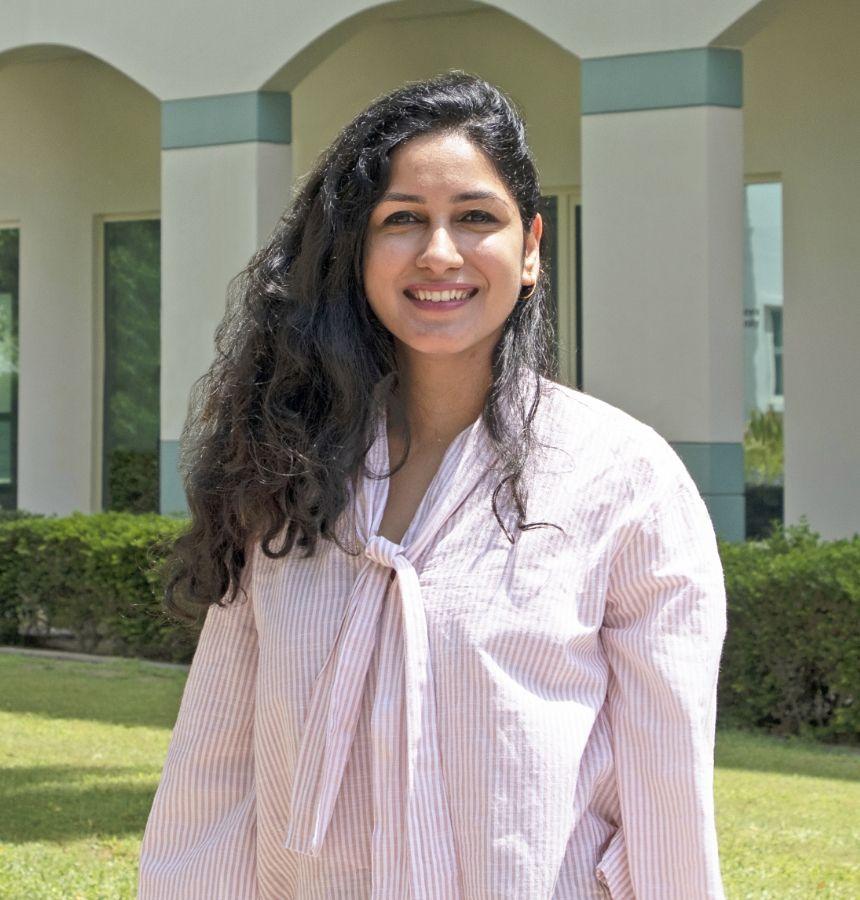
Dr Edyta Monika Sasin
- ROLE:Senior Lecturer Psychology
- CONTACT:+971 04 367 8100
- EMAIL:[email protected]
Dr. Edyta Sasin completed a PhD in Cognitive Psychology at the University of Groningen, Netherlands, where she studied interactions between attention and working memory using psychophysics and EEG. Before joining MDX Dubai, she was a Research Associate at New York University Abu Dhabi.
Our world is overloaded with information, yet our minds have limited processing capacity. Therefore, we must filter distractions and focus on the essentials to achieve our goals. Since our thoughts drive our actions, controlling what we activate in our minds is crucial to prevent disruptive or harmful behavior. We should also forget memories that harm our mental well-being. Dr. Sasin's research aims to understand how certain information from the environment is selected and encoded in memory and which pieces of this information will be retained in memory for longer, and why. Furthermore, her research investigates how the activation of information in working memory interacts with attentional selection and how we can control what to remember and what to forget.
- PhD (Cognitive Psychology) - University of Groningen, Netherlands
- MSc (Psychology) - University of Economics and Human Sciences in Warsaw, Poland
Dr. Sasin's psychology background includes an MSc in Cognitive Neuroscience, a major in Clinical Psychology, a PhD in Cognitive Psychology, and research expertise in attention and memory.
- BCN PhD Training Programme, Research School of Behavioral and Cognitive Neurosciences (2011-2016), University of Groningen, The Netherlands
- The clinical internship at the Provincial Independent Psychiatric Team of Professor Jan Mazurkiewicz, Public Health Care Complex in Pruszków, The Tworki Hospital, Poland (2009)
- Psychonomic Society Graduate Travel Award (2016)
- The Scholarship of the Polish Ministry of Education for Remarkable Achievements (awarded twice - in 2010 and 2011)
- Attention
- Working Memory and Long-Term Memory
- Intentional Forgetting
- Visual Search
- Social Behaviour
Dr. Sasin's primary research aims to understand the bidirectional relationship between attention and memory, the mechanisms for controlling remembering and forgetting, and the hierarchy of processing perceptual and semantic attributes in perception and memory. She also collaborates on projects related to social behavior.
- Sasin, E., Markov, Y., & Fougnie, D. (2023). Meaningful objects avoid attribute amnesia due to incidental long-term memories. Scientific Reports, 13(1), 14464.
- Sasin, E., Sense, F., Nieuwenstein, M., & Fougnie, D. (2022). Training modulates memory-driven capture. Attention, Perception, & Psychophysics, 84, 1509-1518
- Nisa, C. F., Bélanger, J. J., Schumpe, B. M., & Sasin, E. (2021). Secure human attachment can promote support for climate change mitigation. Proceedings of the National Academy of Sciences, 118(37).
- Lin, Y., Sasin, E., & Fougnie, D. (2021). Selection in working memory is resource‐demanding: Concurrent task effects on the retro‐cue benefit. Attention, Perception, & Psychophysics, 1-13.
- Sasin, E., & Fougnie, D. (2021). The road to long-term memory: top-down attention is more effective than bottom-up attention for forming long-term memories. Psychonomic Bulletin & Review, 1-9.
- Sasin, E., & Fougnie, D. (2020). Memory-driven capture occurs for individual features of an object. Scientific Reports, 10, 1-10.
- Nisa, C. F., Sasin, E. M., Faller, D. G., Schumpe, B. M., & Belanger, J. J. (2020). Reply to: Alternative meta-analysis of behavioral interventions to promote action on climate change yields different conclusions. Nature Communications, 11, 1-3.
- Sasin, E., Morey, C.C., & Nieuwenstein, M. (2017). Forget Me if You Can: Attentional capture by to-be-remembered and to-be-forgotten visual stimuli. Psychonomic Bulletin & Review, 24, 1643-1650.
- Sasin, E., & Nieuwenstein, M. (2016). Memory-Driven Attentional Capture Reveals Waxing and Waning in Working Memory Activation. Psychonomic Bulletin & Review, 1-7.
- Sasin, E., Nieuwenstein, M., & Johnson, A. (2015). The role of depth of encoding in attentional capture. Psychonomic Bulletin & Review, 22, 1424–9.
- Jaśkowski, P., Szumska, I., & Sasin, E. (2009). Functional locus of intensity effects in choice reaction time tasks. Journal of Psychophysiology, 23, 126–134.



